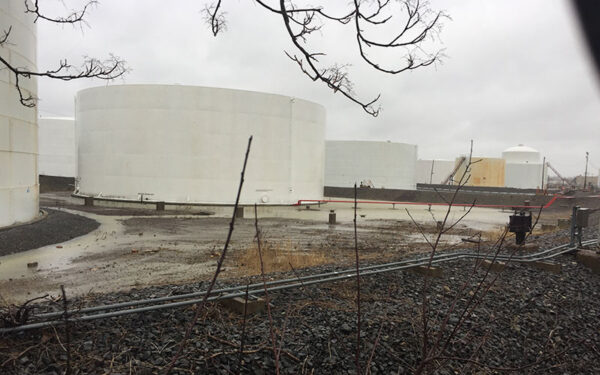
Under the agreement, GlobalFoundries will source a growing percentage of its electricity from renewable energy sources, including Vermont’s in-state sources. Photo: Shutterstock.
The Problem
Last year, GlobalFoundries and Vermont Governor Phil Scott’s administration asked the state’s Public Utility Commission to let the company become what it called a “self-managed utility:” an illegal entity exempt from Vermont’s most important climate laws. That would mean GlobalFoundries could stop purchasing renewable energy and instead buy energy from wherever it wanted – likely the most climate-damaging sources.
It would also mean that the company, the state’s largest climate polluter, could increase its emissions at a time when we should be doing the opposite. And it would mean that GlobalFoundries would stop paying its fair share of taxes that fund some of Vermont’s most important state climate agencies and home weatherization programs (a form of energy efficiency) that help Vermonters with low incomes.
This illegal and unprecedented move flew in the face of Vermont’s just-passed climate law. It was also simply a bad deal for Vermonters, who would have to pick up the slack left by GlobalFoundries and the Scott administration. GlobalFoundries uses more electricity than the entire city of Burlington. The company has a duty, just like the rest of Vermont, to do its part to fight climate change. That’s where CLF stepped in.
CLF in Action
CLF and our partners were pivotal in pushing for Vermont’s climate law. Overriding Governor Scott’s veto, the senate and house passed the law that mandates an 80% reduction to polluting emissions by 2050. GlobalFoundries’ request was the first test of this law. If approved, the company’s request for exemption from the law would have provided an illegal loophole for a wealthy corporation consuming massive amounts of electricity to evade critical climate mandates.
We intervened to ensure this illegal loophole stayed closed. Vermont’s largest company should be a leader in cutting carbon emissions in the state, setting an example for other businesses to follow.
Our work paid off in 2022, when the Public Utility Commission denied GlobalFoundries’ request for special exemption from the state’s climate laws. GlobalFoundries tried again, however, by amending its requests to the Commission to instead create a public utility that would serve a portion of Essex, Vermont.
Progress
As GlobalFoundries continued through the Commission’s review process, CLF advocates sat down with the company’s leaders to see if we could hammer out a compromise. Our advocates worked to ensure the company was able to achieve its goal to acquire cheaper electricity without sacrificing the health and future of Vermont. We succeeded and last week presented the agreement to the Commission for approval.
Under the agreement, GlobalFoundries will form a public utility serving a portion of Essex, Vermont. It will adhere to the state’s Renewable Energy Standard, as well as other renewable energy and energy efficiency requirements. That means that a growing percentage of its electricity must come from renewable energy sources, including Vermont’s in-state sources. This will help ensure GlobalFoundries does its part to fight climate change, along with the rest of Vermont utilities that must follow these rules.
GlobalFoundries has also agreed to pay taxes on the electricity its public utility will sell. Funds raised from these taxes will support weatherization programs, making homes more energy efficient for households with low incomes and funding some of Vermont’s most important climate agencies.
Finally, the company has promised to build a five-megawatt solar plant at its Essex location. This plant will produce some of the energy that the chip factory consumes without spewing climate-damaging pollution.
Next Steps
CLF is excited to reach an agreement that achieves the company’s goals while furthering urgent climate action in Vermont. Now, the Public Utility Commission has to approve the agreement before it can go into effect. If GlobalFoundries or the Public Utility Commission invalidates the settlement, CLF will renew its fight at the Commission and in the Vermont Supreme Court.
This settlement serves as an important reminder of the power of climate laws. But passing these laws is only a first step. They are only promises on paper without implementation and enforcement. CLF advocates are committed to both fighting back against corporations that attempt to shirk their climate responsibility and ensuring that state governments are held accountable to the laws and their emissions targets.



